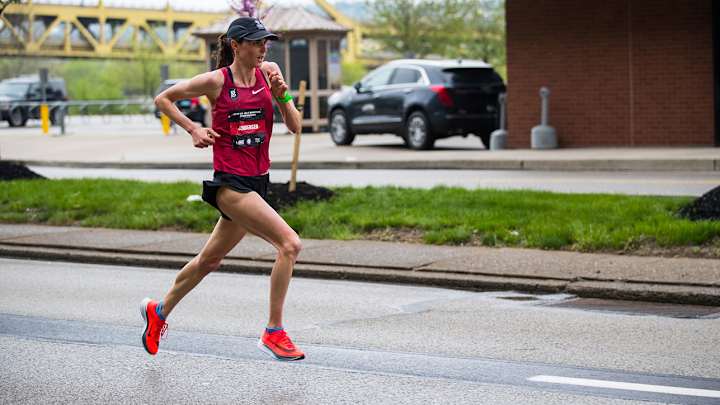Gwen Jorgensen to Race Chicago Marathon In First Test Since Transition from Triathlon

2016 Olympic triathlon gold medalist Gwen Jorgensen will run the 2018 Chicago Marathon on Oct. 7 for her first marathon since giving birth and committing full-time to professional running, race organizers announced.
Jorgensen joins a U.S. field that includes Jordan Hasay, who ran 2:20:57 to place third and become the second-fastest American marathoner of all-time at last year's race, and 2017 World Championship bronze medalist Amy Cragg, who ran 2:21:42 in February's Tokyo Marathon. Cragg and Jorgensen are teammates on the Nike Bowerman Track Club and will train together at altitude in Mammoth Lakes, Calif. before Chicago.
Jorgensen ran 2:41:01 and finished 14th among women for her debut at the 2016 New York City Marathon. That result came off no marathon-specific training and two months after her gold medal in Rio. After the marathon, Jorgensen gave birth to her first child in Aug. 2017. Last November, Jorgensen announced her decision to no longer compete in the triathlon and instead focus on winning gold in the marathon at the 2020 Olympics in Tokyo.
"I heard that Jordan is going after the American record and that would be too ambitious for me," Jorgensen tells SI. "I would not go out with that pace. We haven't really set a time goal for this first race. We probably will once we see how my training progresses. For now, I want to have a good experience where I hold my pace for the 26.2 miles and finish feeling like maybe I had a little more in the tank. I want to finish with a really strong last 10K. We want to have a solid race because a lot of the things I learned from New York is that you really have to respect this distance. I'm being realistic with this first one and just getting some experience in."
Jorgensen has since lowered her 10,000 meters personal best on the track to 31:55.68 in May, finished 5th at the U.S. 10K road championships in July, took 7th in the U.S. Outdoor Track and Field Championships 10,000 meter final and then clocked a 70:58 for her half marathon debut. Despite knowing how ambitious her goal of gold in Tokyo is, Jorgensen remains optimistic.
"We all want immediate success and I would love to be performing better than I am but I also know that it's going to take some time," Jorgensen says. "I'm putting in many miles on my legs which is fatiguing. I need to learn how to run on tired legs. That's something I just quite can't do yet but I know that with time I will be able to. I knew from the beginning that this wasn't going to be easy. Looking at my results, you can tell it's not. It's going to take a lot of work. I believe I can still do it and I remind myself of what I was like in my first triathlon year. The second year, I was at the Olympics. I bring myself back to those days. It's easy to remember all the good like my winning streak or gold medal but it's easy to forget all the struggles I had."
The men's elite field for the Chicago Marathon is headlined by last year's champion and two-time Olympic medalist Galen Rupp. Mo Farah, the 5,000 meter and 10,000 meter Olympic gold medalist from London and Rio, is also in the field along with 2018 Boston Marathon champion Yuki Kawauchi of Japan.
The following interview appears in the Scorecard section of the Aug. 27, 2018, issue of Sports Illustrated. For more great storytelling and in-depth analysis, subscribe to the magazine—and get up to 94% off the cover price. Click here for more.
SI:Why is running a sport in which mothers seem to thrive at the world-class level?
GJ: You see the pioneers like [American marathon record holder] Deena Kastor and [two-time Olympian] Kara Goucher, who have a kid and come back. They give a lot of hope and inspiration for want-to-be mothers to compete. You see one person do it and think, If they could do it, I could do it.
SI:You were running and training during your pregnancy. Is that something you'd recommend to an average athlete?
GJ: I would recommend exercising and running if you don't feel pain. I ran hard and got my heart rate up. I had an internal mechanism that wouldn't let me go faster than a certain speed. Our bodies know. Keeping active is good for you and the baby.
SI:How did you know that you were ready to get back into running?
GJ: Everyone is different. For me, it took a while. You have to feel it out. I took seven weeks off and had to start really slow. My first workout was a one-minute run and five-minute walk four times.
SI:How did you remain patient as you returned to training?
GJ: It felt like a year, but it was just two months. I was able to progress quickly. Six months after giving birth, I was running PRs on the track. It's hard to have that perspective when you're going through it. You just need to be patient and kind to yourself. I was really trying to enjoy that time with Stanley because I knew I wouldn't always have the luxury of spending time with him. I can at least be a good mom.

An avid runner, Chris Chavez covers track and field, marathons and the Olympics for Sports Illustrated.